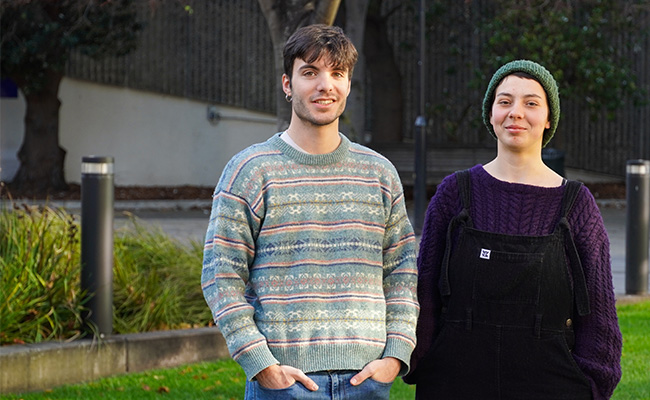
Alessandro and Helena have found and new politics paper on settler state politics in Aotearoa and Australia has shifted their mindsets.
Critical race theory is something mentioned increasingly in culture wars conversations at present – but what is it and how does it fit into an Antipodean context?
These are questions most people don’t really know the answers to, says Dr Christine Winter, a Senior Lecturer in environmental, climate change, multispecies and indigenous politics, who is teaching the paper “Settler state politics in Aotearoa and Australia” for the first time at Otago this year.
Dr Winter’s Tōrakapū (Politics) page outlines her research focusing on academic political theory, and particularly theories of justice, with a focus on the ways these theories continue to perpetuate injustice for some people, and more specifically for Māori, and the environment.
She came up with the idea for the POLS230 paper after returning from Australia, where she taught a class on Aboriginal politics at the University of Sydney.
“The decision to teach that paper was fraught in a lot of ways, I knew I wasn’t the person who should have been teaching it but there was no-one of Australian Indigenous heritage in the department and the paper had been shelved.
“I knew it was important that it was taught, and the students loved it.”
Upon returning to Aotearoa, Dr Winter decided it would be useful for students to have a comparison between settler state politics in Aotearoa and Australia, from a decolonial perspective and through the lens of political theories.
“It is so current, people are so desperate for information and education on this topic.”
The paper is presented through a decolonial lens so that students can understand decolonial theory and critical race theory with specific examples that they can relate to.
Dr Winter says she likes working in the abstract but that can be “so hard” for undergraduate students.
To show real comparisons between Australia and Aotearoa is very helpful for their understanding of the concepts, she says.
“It can be easy to get lost in the weeds of what happens in New Zealand, without realising that the oppression and domination of Māori is not just something that happens here - it is a part of a colonial system, and it happens globally.”
Dr Winter says Māori, Aboriginal and Torres Strait Islander experiences of settler colonialism are both very different and dismally similar.
“In this course we discuss the philosophic and political fictions that underwrote colonialism and the theft of land, waters, seas, and associated life forms, and framed the deliberate attempts to suppress Māori, Aboriginal and Torres Strait Islander politics, knowledge systems, philosophies, culture and spirituality.”
Helena is a BA Sociology second year, in their first year at Otago.
They grew up in Hauraki but their parents are from Germany.
They say they took Dr Winter’s paper because it seemed relevant to current discussions in the media, but with a focus on issues more locally.
There is often a rosy image from outside Aotearoa, and even within Pākehā Aotearoa, that “at least we aren’t as bad as Australia or America” but this course has showed them that that isn’t really the case, they say.
“My parents immigrated here from Germany, and I am fascinated by the idea of utopia/dystopia in this context. New Zealand is a colonial capitalist utopia which is an indigenous dystopia.
“The dystopia that Pākehā see approaching through the climate crisis is what Pākehā caused for Māori.”
Helena says Dr Winter does a great job of highlighting the similarities between strategies of resistance and colonisation, but also the differences.
“She talks a lot about time and how settler colonial perspectives of time and land are very different and how different cultural groups have viewed the world.”
Alessandro, who is double majoring in Anthropology and Environmental Studies and minoring in Global Studies, is a third year tauira originally from Italy, but here for the semester on exchange from their university in the United States.
As a “foreigner”, this paper has challenged the rhetoric about New Zealand they had heard in Italy.
“One of the biggest things people think in Italy is that New Zealand is the perfect country where no racism exists, it’s a very sustainable country and it’s what the whole world should be like.
“I have been learning through this course the way that Māori and the environment are affected by settler state politics, which has allowed me to have a better understanding of the reality and debunk some of the ideas I learnt back home.”
They say almost all the readings for the paper are written by Māori and Aboriginal writers, which would be “very unusual” for a course in Italy or the States.
“The readings gave me a glimpse of what this looks like for the people it affects and I found it very, very beautiful.”
Alessandro says that in the course structure there has been a concerted effort to centre the voices of the disenfranchised.
Helena wants people to remember that colonisation is a structure not an event and that colonial power structures are still operating globally.
“Neither of us are actually studying politics, which is interesting. It shows that this paper has a wide use and interest for a variety of different disciplines.
“In fact, this course is an important basis to almost any discipline, especially for Pākehā in New Zealand.”
Alessandro says he thinks it is particularly important for international students: “we are being hosted here and we should not forget that this country is not just Pākehā New Zealand”.
“I will tell my friends coming on exchange next semester to take Christine’s papers.”
Kōrero by Internal Communications Adviser Alice Billington